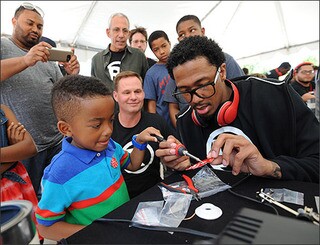
After nearly 20 years of sponsorship, the technology company Intel will no longer support the International Science and Engineering Fair, currently known as the Intel ISEF, starting in 2019. The Society for Science & the Public, the nonprofit that sponsors the fairs, is launching a competitive process to find a new sponsor for the fair for the first time since 1998.
The news comes two years after Intel announced it would drop its backing of the Science Talent Search, a contest for high school seniors also run by the nonprofit Society for Science & the Public, in 2015. That program is now sponsored by Regeneron Pharmaceuticals, a biotech company.
Both moves are evidence of a shift in attention, at Intel and in many schools, from more traditional science fairs to other STEM-focused initiatives like the Hour of Code and maker “faires” at which people make and showcase engineering projects. At the same time, the ISEF remains the largest K-12 science contest in the world: Approximately 1,800 students from more than 70 countries participated in the event last year and were awarded more than $4 million in prizes. The 2016 contest’s winners’ projects involved everything from rechargeable batteries to cancer drugs. Past winners have gone on to significant and often illustrious careers in the sciences.
In a press release, Intel said it was proud of its long-running support for both science fairs. The company is still sponsoring other science-and-technology related events for young people, most notably maker fairs. (You can read more on the maker movement in K-12 schools here.) It is also sponsoring initiatives to support more women and minorities who are interested in engineering and technology.
In the same release, Maya Ajmera, the president and CEO of the Society for Science & the Public and the publisher of Science News, said, “this competition and its affiliated science fairs held across the globe reach young people like no other program can, igniting their passion for science and their desire to discover innovative solutions to some of our world’s most intractable problems.”
The New York Times reports that Ajmera said that Intel did not give a particular reason for ending its sponsorship in 2019. But the Times also reports that some employees say the science fairs’ focus on sciences that aren’t directly tied to computer technology may have been part of the motive for Intel’s change in funding priorities.
The New York Times reports that the decision, and the role of science fairs in general, is a point of disagreement between Intel’s current CEO, Brian Krzanich, and its past CEO Craig R. Barrett.
Krzanich, the Times reports, told colleagues that science fairs are relics of the past and focus heavily on the life sciences and biotechnology, which aren’t part of Intel’s core business. Barrett, on the other hand, told the Times that all sciences increasingly involve computing, saying in an email that “you might instead conclude that Intel is a company of the past, just like Westinghouse,” the fairs’ previous sponsor, which stopped supporting the national science fair in the 1990s after a period of decline.
When Intel announced that it would stop supporting the Science Talent Search in 2015, The Atlantic reported that some employees said that decision, too, was driven by the fact that few projects focused directly on technology. The Atlantic also noted that while the Science Talent Search was thriving, local and regional science fairs seem to be in decline, driven by factors like increasing time devoted to test prep and some schools’ lack of access to high-tech materials.
The Times piece includes testimonials from several past winners who described the fair as transformative, teaching them how science works in practice in a way that textbooks can’t. Other technology companies, including Google, still sponsor science fairs. President Obama also hosted an annual science fair at the White House.
Photo: RadioShack Chief Creative Officer Nick Cannon helps attendees build LED robots made by the company last year at the National Maker Faire in Washington. Intel supports the Maker Faire in the Bay Area, but will no longer sponsor the International Science and Engineering Fair. -- Gail Burton/Invision/AP-File
Related stories: